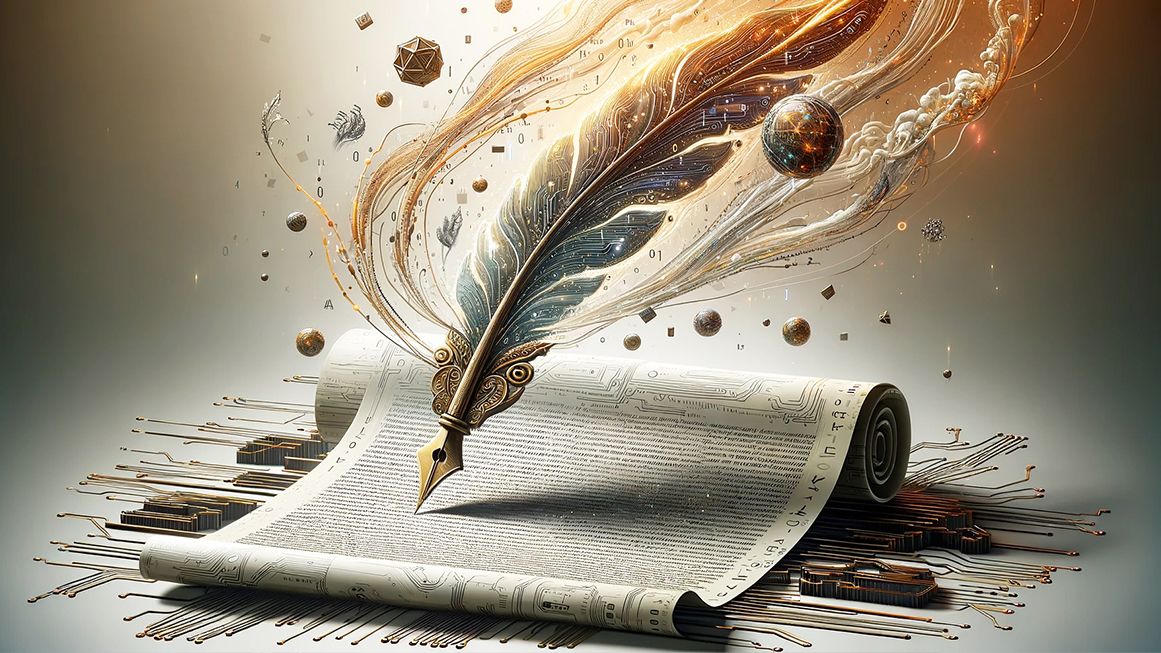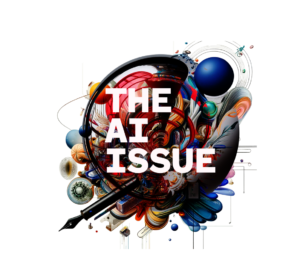'AI Bullshit' Makes Poets Mad
Is AI-written poetry cheating if you laboriously trained the AI?


When the conceptual poet Lillian-Yvonne Bertram began to experiment with large language models (LLMs) in 2018, they discovered unexpected poetry inside ChatGPT-2. "The prompt responses were quirky: prone to interesting conversations and uncanny and poetic slippages. There was a strangeness about them," they wrote in the introduction to their new AI poetry collection, A Black Story May Contain Sensitive Content.
"The responses made you feel like someone was maybe looking over your shoulder, or the machine had read your horoscope or your diary, like it just knew things," wrote the poet, who uses they/them pronouns.
On July 29, 2023, when Bertram announced on Twitter that they had won the New Michigan Press/DIAGRAM chapbook contest for a poetry collection "generated" by ChatGPT-3, there was immediate backlash.
This outcome—that a book written by AI would defeat honest books carved from the hearts and souls of living poets—is the stuff of writers' nightmares.
Novelist, professor, and book critic Gabino Iglesias tweeted in response to the contest results, "Someone told me about this and I was like 'Nah, can't be.' Well, apparently it is. Imagine working you [sic] ass off and then losing to an 'AI chapbook.' I hope the submission call asked specifically for AI bullshit." (It did not.)
Iglesias' tweet garnered replies such as, "This just makes me saddened and angry at the same time if that makes sense," and "I hope the check bounces when she tries to cash it. I can't believe this is where we're at right now." (The cash prize is $1,000, presumably generated by the contest's $25 entry fee.)
Past literary controversies—over adult novels such as American Dirt or Elizabeth Gilbert's self-canceled Russian novel The Snow Forest, or young adult novels such as The Black Witch—have centered on the "harm" these novels pose to marginalized or victimized groups. In the case of Bertram's poetry collection, the alleged harm was against other creative writers.
As much as writers feel that AI poses an existential threat to their work, the real competition they face is each other. There are too many creative writers, produced by too many creative writing MFA programs (there are over 250), all competing for crumbs of prestige, glimmers of significance.
Bertram is one of few creative writers using AI as a tool to explore and expose the limits of the technology, at a time when other writers are organizing litigation against tech companies, such as OpenAI, that trained their LLMs on copyrighted work without permission or compensation.
For The Atlantic, journalist and programmer Alex Reisner has described the culture clash between the tech industry's open-source ethos and the publishing industry's commitment to protecting intellectual property. The question is whether training AI on copyrighted books falls under fair use, a legal doctrine that allows copying (without permission from the copyright holder) in limited circumstances if the resulting work is "transformative."
The foundation of A Black Story May Contain Sensitive Content is an LLM that Bertram "fine-tuned" on the work of Gwendolyn Brooks, the first black poet to win a Pulitzer Prize, who once wrote:
"Art hurts. Art urges voyages— / and it is easier to stay at home…."
The process of "fine-tuning" allows a programmer to turn the generic GPT into a specialist. As a poet, I understand this as akin to discovering Sylvia Plath as a teenager and suddenly all you can write are (bad) Plath poems.
Not all of Brooks' work had been digitized, so Bertram scanned and typed Brooks' books and interviews, with help from two graduate students, into a document that totaled 225,000 words. Bertram named the fine-tuned GPT-3 model "Warpland 2.0." As far as I can tell, this was done without permission from Brooks' estate.
The implication that Bertram "cheated" by using GPT is ironic, given that the process to fine-tune Warpland 2.0 makes this, in my estimation, the most time- and labor-intensive poetry chapbook in history.
A Black Story May Contain Sensitive Content is structured around three different prompts that Bertram gave Warpland 2.0. One of these prompts is: "Tell me a Black story."
Bertram noticed that when they gave the generic GPT-3 model ("Davinci") that prompt, the resulting narrative was told at a distance, in third person, about a black character overcoming hardship. They juxtapose these narratives against the responses to the same prompt from Warpland 2.0. Here's Davinci:
Once upon a time, there was a black family who lived in the inner city. They were very poor and struggled to make ends meet. However they were a close-knit family and loved each other dearly. One day, the father was killed in a drive-by shooting. The family was devastated. However, they pulled together and leaned on each other for support. They eventually overcame their grief and went on to lead happy and successful lives.
Most of the Warpland 2.0 responses to the prompt "Tell me a Black story" are also written in prose (after all, Bertram didn't prompt, "Tell me a Black story, written in verse"), but here is one verse excerpt, generated by Warpland 2.0, that gives me an uncanny shiver:
If they know one, tell me a Black story,
If they know one. Tell me
about the Black enigma,
tell me about the Black reality.
Tell me about the Black conundrum.
Tell me about the Black en-
Thrallment. Tell me about the
Black enchantment.
Who is "they"? The repetition of the line "if they know one" reads as a wink from beyond the veil, as if the ghost of Brooks has seen the disappointing results from Davinci.
"Poetry leaves something out," the poet and critic Elisa Gabbert writes, in an attempt to define a slippery literary form. "The poetic is not merely beauty in language, but beauty in incoherence, in resistance to common sense. The missingness of poetry slows readers down, making them search for what can't be found."
AI cannot kill poetry. The intersection of people who write poetry and people who read poetry is very nearly a circle.
As Warpland 2.0 puts it, "I am going to keep writing poetry until the day I die. I don't know if it's any good or not, but I'm going to keep on doing it."


Show Comments (62)